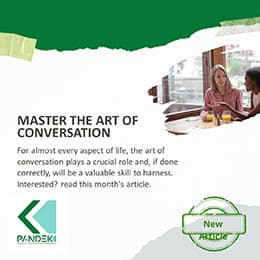Explaining the science of LEGO® Serious Play® and its benefits
Ah LEGO, that familiar old toy with the colourful bricks. It probably provided you with …

Ah LEGO, that familiar old toy with the colourful bricks. It probably provided you with …
You probably already have a general idea of the importance of team alignment in a …
Have you ever wondered how to create a team vision statement to map out your …
In our last article we examined the difference between a vision statement and mission statement. …
For the last few months, our blog posts have focused on how you can improve …
Are you new to a leadership role? Well worry not, we have seven tips to …
In the world of business, leadership is one of the most important components to creating …
The chance is that if you are interested in this series, you are probably already …
In a recent article published by the BBC, author Bryan Lufkin talks about the ripple …
The best cultures are the ones where the company values fit the organisation’s vision and …
For almost every aspect of life, conversation plays a crucial role and, if done correctly, can be a valuable skill. Conversations can bring you closer to influential people, communities, partners, and friends. You will probably find it harder to make friends, start a business, or advance your career without speaking to people. The hardest part, though, is getting started. Below, we have created a guide for you with 5 communication habits to help build workplace relationships. Master these communication skills with the help of PANDEK, and you will find that you will never need to worry about talking to someone again.

If you desire effective communication with colleagues then you should make an effort to ask them questions. However, be aware that not all questions are equal in terms of their likeability. For example, it is far better to use questions that require expanding on a previous point of conversation rather than switching between topics. Even worse still is simply repeating back questions that somebody in the same conversation has already asked you. In one study, researchers found that the rate people asked questions often determined their likeability (Huang et al, 2017). Participants on the higher end of the asking question scale were reported by their partners more positively than participants on the lower end of the scale (Huang et al, 2017).
Indeed, researchers of another study found that the number of questions asked by a participant at a speed-dating event could often predict their success in securing another meeting (Robson, 2021). Importantly, research suggests that most people fail to utilise the power of question-asking to their advantage. It seems that if we all spent less time talking and a little more time listening, then maybe we would connect with colleagues or employees more effectively. In turn, this could eventually improve internal communication and boost productivity.
We have all heard the expression: “place yourself in someone else’s shoes”, but this doesn’t always show how another person feels. According to Professor Epley, a behavioural scientist at the University of Chicago, one reason is that people tend to use their own experience to proxy for how someone else is feeling (Robson, 2021). This can at times harm a relationship you have with someone, especially if you are closer to that person. Studies reveal that where we perceive close friends and partners to be like us, so we are at risk of assuming their thoughts and feelings based on our existing knowledge of them (Savitsky et al, 2021). Communication workshops can improve interpersonal communication, but it helps to be aware of your biases when communicating in the office. Next time you are in conversation with someone, don’t assume their perspective. Instead, use tip 1 and ask questions to better understand the context.
Effective conversations are a lot like effective team meetings, it is always helpful to be on the same page. As such, it is worth choosing topics that lean on shared experience over originality. This is because gaps in our knowledge about a new subject can lead to confusion from the listener or awkward pauses, known as the novelty penalty (Cooney et al, 2017). Instead, it is recommended that when speaking to people, try to cover a familiar topic to both audiences so that the listeners can fill in those gaps of knowledge for themselves. If you want to talk about a new topic, make sure it can be relatable for the audience or that the information has been fine-tuned for listeners. Keeping topics relatable using these approaches will help to improve your communication skills, both at work and everyday life.

The best way to connect with people is to go deeper than the mundane. Research shows that most people are interested in talking about shared human experiences, even with strangers (Kardas et al, 2021). Plus, the nature of these exchanges can be very touching because these types of conversations allow one another access to each other’s minds.
Research has shown that honesty with a good pinch of diplomacy works best for people in conversation (Robson, 2021). At PANDEK, we encourage honesty to maximise our communication workshops. Without it, the open conversation aspect of productive team communication breaks down. So, next time you are about to make a comment, think carefully about the timing of your words, the way they are phrased and whether the person will have the opportunity to make use of the information you are about to tell them.

Always remain conscious of how the other person is reacting. It is crucial to step away from an unwelcome conversation or if you see that someone is uncomfortable. But practice these 5 effective communication skills, and hopefully, with tact, sensitivity and genuine interest in the people around you, you will never find that conversation is unwelcome. Instead, you should find that greater social connection and constructive communication is easily within your reach.
PANDEK COACHING is here for you should you need a communication skills workshop
If you struggle with confidence and connecting with people, we are here to make the process easier for you. As Coaches, we also assist individuals with personal development struggles, such as self-empowerment and happiness. Often, everything a client needs is already within their reach, but sometimes they need guidance to gain a fresh perspective. This coaching process helps clients rebuild their confidence by realizing their key strengths and talents and setting sustainable goals.
For inquiries, please email us at [email protected] or
book a free 30-minute consultation at https://pandek.org/.
We understand that each company’s situation is unique. Tell us more about your needs and challenges and we will get back to you soon with some ideas, or book a free conversation and begin your journey.
COPYRIGHT © 2024 PANDEK GROUP LIMITED - ALL RIGHTS RESERVED - COMPANIES HOUSE - 12467210 - Operating across the UK - Based in the South West